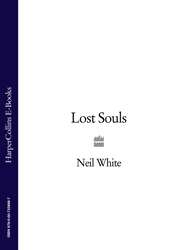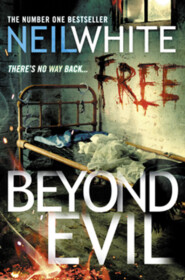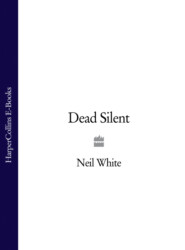По всем вопросам обращайтесь на: info@litportal.ru
(©) 2003-2024.
✖
Neil White 3 Book Bundle
Автор
Год написания книги
2018
Настройки чтения
Размер шрифта
Высота строк
Поля
There was a television playing in one of the flats, and as he climbed, the landings just got darker. The switch for the lights was a push-button timer that slowly released itself, but it didn’t give him enough time to get upstairs. By the time he got to the top floor, flat number six, he had to feel his way along, the number visible only in silhouette against the faint light that came through a glass door. There were small steps on the other side, and so he guessed that it was the loft flat.
Charlie knocked at the door, but there was no answer. All he could do was wait.
His phone rang. He checked the screen. It was Julie, his ex. When he pressed the answer, he let Julie speak first.
‘Charlie, it’s me. I’ve heard about Amelia. We need to talk to you about what happened.’
Charlie thought about whether to answer, but the urge to know what was being said was too strong. ‘What’s the word? Why do you want to speak to me?’
‘I can’t tell you that. You know how it is.’ There was a pause, and then, ‘You need to come in, Charlie.’
‘What, to the station?’
‘Yes. They need to talk to you.’
Charlie closed his eyes for a moment. It felt like everyone was closing in on him.
‘No, I can’t,’ he said, and then he clicked off his phone.
More than an hour passed before he heard footsteps. He had spent that time with his head in his hands, expecting the sound of the police rushing the stairs, but it had stayed quiet. So he had gone over Amelia’s death in his head, trying to make some sense of it all. But he couldn’t, however much he tried, because he didn’t know what was behind it, other than it somehow involved Billy Privett.
He heard footsteps, and tensed up, waiting for the glimpse of a uniform, but he knew it was Donia before he saw her. The footsteps weren’t heavy enough to be the police. When she rounded the corner, she smiled and held out her shoulder bag. It looked heavy.
‘I got it,’ she said.
‘Let’s get inside,’ Charlie said, nodding gratefully but not up to returning the smile.
Donia’s apartment was dark and smelled fusty and damp, or perhaps it was just old cigarettes. There were two bedrooms, but there was a bunk bed in the hallway as well, and so he guessed that in the summer it was all about cramming them in, living off the hill walkers. The carpet was rough carpet tiles, cigarette burns in some, and as he turned into the living room, he saw that it was just a collection of chairs with wooden arms facing a small television, heat provided by a three-bar electric fire topped by plastic coals.
‘Is this low rent, or some kind of retro trendy thing I don’t quite get?’ Charlie said, in an effort to appear normal.
Donia laughed and put her bag down on one of the chairs. ‘It was cheap and not far from your office. I’m thinking of spending the summer here, if things work out.’ Then she blushed and became apologetic. ‘I’m sorry. I wanted to spend the summer working for you, but things have changed, I know, with what happened to Amelia.’ She paused, and then asked, ‘What happened to her?’
Charlie sat down opposite her and closed his eyes. He put his head back against the wall. ‘Make me a drink and we’ll talk about it,’ he said. ‘It’s been one hell of a day.’
He listened as Donia bustled around in the kitchen, and not long after he opened his eyes to see her holding out a mug of coffee and what looked like a cheese sandwich.
‘You look hungry,’ she said.
He was, although he’d hoped the drink was going to be colder and stronger. He thanked her anyway. She watched him eat, her head in her hand as she sat at a table by the window, a white placemat and a vase of plastic flowers adding some fake grandeur to the scuffed surface.
When he put the plate down and drank some of the coffee, she said, ‘The police wouldn’t tell us what happened to Amelia.’
‘How was Linda?’
‘Upset, and she didn’t know what to do, because you weren’t there. She let the police look round the office. Was that all right?’
‘Yes, fine,’ Charlie said. ‘Did they take anything away?’
Donia shook her head. ‘Linda printed Amelia’s appointment list and client list for them, but that was it. They said she had been killed, and that they needed to speak to you, but didn’t say why.’
‘How long were they there for?’
‘Not long.’ Donia took a drink of her own coffee and then said, ‘Those people were hanging round outside the office again.’
‘Which people?’
‘Those people all in black. You spoke to them yesterday.’
Charlie felt uneasy. ‘What were they doing?’
‘Just waiting around.’
‘Did they follow you?’
‘I don’t think so.’ Donia looked worried. ‘What, do you think they might have done?’
‘Check out of the window. If they have, it will be me they are interested in, not you.’
Donia went past him and pulled the curtain to one side. She peered out of the window and then shook her head. ‘I can’t see them.’ When she turned back to Charlie, she said, ‘Why are you running?’
Charlie sighed. He knew that if there was enough planted evidence to put him in a dock, the fact that he ran would be the first thing in the minds of the jury.
‘Because I want to try and find out what happened,’ he said. ‘I’m worried that if the police think I did it, they’ll stop me.’
‘Why would they think you did it?’
Charlie didn’t want to answer that, because it would mean disclosing the knife. ‘Do you think I might have done it?’ he said instead.
‘I don’t really know you,’ she said, her teeth chewing at her lip.
‘So if you’re not ruling it out, why have you let me in?’
She shrugged but didn’t answer.
He put his cup down. ‘I need a proper drink. Have you got anything?’
Donia shook her head. ‘I don’t drink much.’
‘Sensible.’
‘You drink too much.’
‘Depends on the reason. If I’m drinking so that I don’t have to face up to my life, I’m not drinking enough.’
‘Is your life that bad? It looks good to me.’
‘Go on, make it better for me. Why is it good?’











